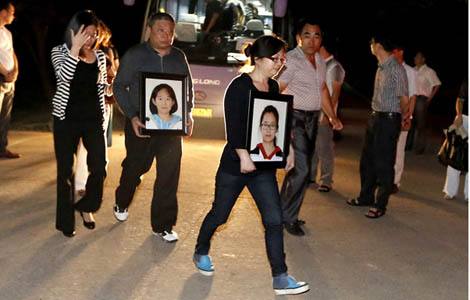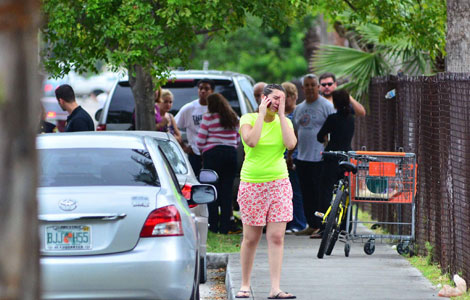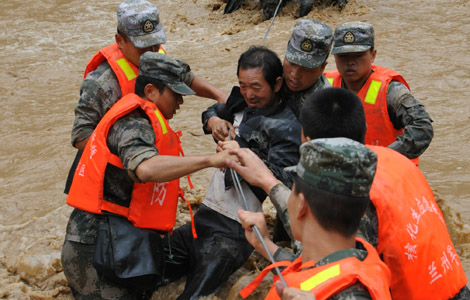Memorial to Korean "comfort women" victims causes stir
Updated: 2013-07-30 11:29
By Chen Jia (China Daily)
|
||||||||

The Japanese consulate-general's pressure on South California Glendale City officials to stop the installation of a statue on public land dedicated to World War II-era Korean "comfort women" has some Asian Americans riled.
Ignatius Y. Ding, executive vice-president of the Global Alliance for Preserving the History of WWII in Asia, told China Daily that the Japanese government "shields and hides them from the truth" and refuses to "take responsibility for their military sexual slavery".
"Comfort women" were Asian women - many Chinese and Korean - who were forced into sexual slavery by the Japanese military during World War II. Abducted from their homes, most of these women were raped, lost their fertility and never returned home after long-time ordeals of humiliation and physical and psychological abuse.The Glendale City Council approved erecting a memorial statue to their memory. The statue is a replica of one standing in front of the Japanese Embassy in Seoul.
Last Wednesday, Kuni Sato, press secretary for the Japanese foreign ministry, said that Japan had gone to great lengths to address the "comfort women" issue by providing compensation to surviving rape victims through a private fund, according to UPI.
However, some of the surviving "comfort women" rejected money from the fund, criticizing it as an attempt by the Japanese government to skirt responsibility.
"How dare [Japaneseconsul-general] Niimi claim that Japan has apologized and paid out reparation to individuals and victimized nations?Not a single cent from the Japanese government went to any Chinese or Korean victims or their countries," Ding said. "Abe openly rejected the verdicts of the Tokyo War Crimes Trial and rejected altogether the legitimacy of the International Tribunal."
The Japanese Diet, led by the ultra-rightist LDP, voted down the official apology resolution after then Japanese Prime Minister Tomiichi Murayama of the Socialist Party offered his personal apology to WWII victims in 1995, he said.
The "compensation" money given to the American POWs incarcerated by the brutal Imperial Japanese Military - one dollar per day per person for time in sub-humane captivity - was actually from funds from the International Red Cross intended for US soldiers during the war that were confiscated by Japan, in clear violation of international laws and treaties, he said.
Japanese Prime Minister Shinzo Abe still insists that there is no official record to prove the Japanese government was ever involved in, let alone initiated, the conscription or enslavement of "comfort women", he said.
All purported "apologies" have not only been vague, but meaningless, with words like "it is regrettable some of you got severely hurt or injured," he said.
"Murdering 35 million people and enslaving hundreds of thousands of young girls andwomenwas not just an injury or damage, but a huge and historically unprecedented atrocity," he said.
Ding drafted and ushered through the Board of San Francisco City and County Supervisors a resolution condemning Osaka mayor Toru Hashimoto and demanding follow-up actions by the city and the US Congress. He was also behind the passage of the 2007 "ComfortWomen" legislation introduced by Congressman Mike Honda, as well as a multi-million-signature Internet drive protesting Japan's bid for a permanent seat on the United Nations Security Council.
Peter Li, a professor emeritus at Rutgers University, said the Japanese consulate-general has no right to object to the establishment of a monument to honor the Korean "comfort women" on American soil by Korean Americans.
"Recent statements by Japanese politicians reflect a total rejection of any responsibility by the Japanese government for the establishment and administration of the 'comfort women' system," Li said. "This is morally abhorrent. The government should unambiguously assume responsibility and admit the wrong doing."
Until Japan assumes full responsibility for its war crimes and human rights violations during World War II, there can be no true reconciliation, he said. "Monuments and memorials will be continuously established around the world. Japan will always be remembered for its brutal atrocities committed during the war," he said.
"My only regret is the American public seems to perceive the issue of'comfortwomen'as a purely Korean-American concern and that the Glendale Council has apparently invited only survivors from Korea to participate in the unveiling of the statue," said Ivy Lee, emeritus professor atCalifornia State University, Sacramento.
"Japan's war of aggression was fought mostly on Chinese soil with most of the Imperial Forces stationed in China.Therefore, most of thecomfortstations were established in China and as many - if not more - Chinesewomenwere conscripted into sexual slavery," Lee said.
"The more Japan denies, the more the rest of the people of Asia will insist on remembering and remind Japan at every opportunity," said George Koo,an international business consultant and board member of New America Media.
The tragedy of Japan is that the people of Japan have been kept ignorant of the full extent of atrocities committed by their imperial troops during WWII, and the deliberate cover-up has been through the concerted efforts of their government, he said.
The return of Abe to power with his right wing inclination to continue to deny does not bode well for Japan and its relations with the rest of Asian nations, he added.
Contact the writer at chenjia@chinadailyusa.com
(China Daily USA 07/30/2013 page2)
Most Viewed
Editor's Picks

|

|

|

|

|

|
Today's Top News
Former US president plans to visit DPRK
China struggles to retain talents
Families of crash victims to sue Asiana in the US
Detroit: Gold mine for China
Major SOEs eye profits from abroad
Train collision kills at least 44 in Switzerland
Sino-Japanese summit ruled out
Manila's base plan targets China
US Weekly

|

|















